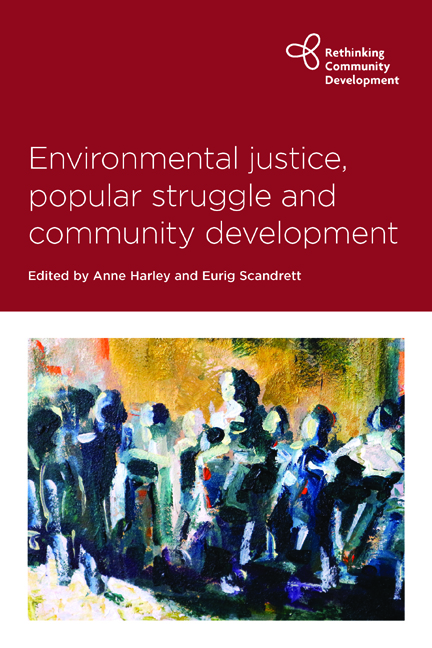Book contents
- Frontmatter
- Dedication
- Contents
- List of figures
- Series editors’ preface: Rethinking Community Development
- Preface
- Acknowledgements
- Notes on contributors
- Abbreviations
- One Community, development and popular struggles for environmental justice
- Two Resisting Shell in Ireland: making and remaking alliances between communities, movements and activists
- Three ‘No tenemos armas pero tenemos dignidad’: learning from the civic strike in Buenaventura, Colombia
- Four No pollution and no Roma in my backyard: class and race in framing local activism in Laborov, eastern Slovakia
- Five Tackling waste in Scotland: incineration, business and politics vs community activism
- Six An unfractured line: an academic tale of self-reflective social movement learning in the Nova Scotia anti-fracking movement
- Seven ‘Mines come to bring poverty’: extractive industry in the life of the people in KwaZulu-Natal, South Africa
- Eight Ecological justice for Palestine
- Nine Learning and teaching: reflections on an environmental justice school for activists in South Africa
- Ten The environment as a site of struggle against settler-colonisation in Palestine
- Eleven Communities resisting environmental injustice in India: philanthrocapitalism and incorporation of people’s movements
- Twelve Grassroots struggles to protect occupational and environmental health
- Conclusion
- Index
Eleven - Communities resisting environmental injustice in India: philanthrocapitalism and incorporation of people’s movements
Published online by Cambridge University Press: 27 April 2022
- Frontmatter
- Dedication
- Contents
- List of figures
- Series editors’ preface: Rethinking Community Development
- Preface
- Acknowledgements
- Notes on contributors
- Abbreviations
- One Community, development and popular struggles for environmental justice
- Two Resisting Shell in Ireland: making and remaking alliances between communities, movements and activists
- Three ‘No tenemos armas pero tenemos dignidad’: learning from the civic strike in Buenaventura, Colombia
- Four No pollution and no Roma in my backyard: class and race in framing local activism in Laborov, eastern Slovakia
- Five Tackling waste in Scotland: incineration, business and politics vs community activism
- Six An unfractured line: an academic tale of self-reflective social movement learning in the Nova Scotia anti-fracking movement
- Seven ‘Mines come to bring poverty’: extractive industry in the life of the people in KwaZulu-Natal, South Africa
- Eight Ecological justice for Palestine
- Nine Learning and teaching: reflections on an environmental justice school for activists in South Africa
- Ten The environment as a site of struggle against settler-colonisation in Palestine
- Eleven Communities resisting environmental injustice in India: philanthrocapitalism and incorporation of people’s movements
- Twelve Grassroots struggles to protect occupational and environmental health
- Conclusion
- Index
Summary
A diverse, fragmented movement
In December 2014 hundreds of activists gathered in Bhopal for the 30th anniversary of the gas disaster at the Union Carbide insecticide factory in the city. At a gathering for solidarity activists from outside Bhopal and Mela (festival) of the Alternatives, diverse community groups, social movements and NGOs held stalls and exhibitions. There were activists fighting against nuclear power, uranium mining, coal mining, military testing, pesticides; advocating for the rights of Adivasis, Dalits, women, peasants, workers, displaced communities; and projects working in community development, alternative production, recycling initiatives, grassroots health promotion, social movement development and workers’ mobilisation. A handful of those who had travelled to Bhopal for the anniversary had come from outside India: health activists from Japan, bringing solidarity from the victims of the Minamata mercury pollution disaster; a group of trade union occupational health activists from Scotland (including Eurig); a message of solidarity from Friends of the Earth International. But the vast majority of those present were from communities campaigning for environmental justice in different parts of India.
The anniversary event was organised by the International Campaign for Justice in Bhopal, an alliance of local community- and trade unionbased survivors’ groups and solidarity campaigns with international supporters, with a structure that ensures that the solidarity activists are accountable to the survivors. One group that was not present was the Bhopal Gas Peedit Mahila Udyog Sangathan (Organisation of Bhopal Gas Affected Women Workers), a separate Bhopal survivors’ group that organised commemorations with its own solidarity networks (Bhopal Survivors Movement Study, 2009). The event perhaps illustrates some core aspects of the Indian environmental justice movement more widely: the contradictory tensions of diversity, solidarity and division. The Bhopal survivors’ movement, like the wider Indian environmental justice movement, has seen a few victories and many defeats in its struggle for justice.
Although the Indian environmental justice movement has seen some celebrated successes (such as the Dongria Kondh tribal community's iconic victory against British mining corporation Vedanta in 2014), there have been many high-profile defeats (including the completion of the Sardar Sarovar dam on the Narmada river in defiance of the long-running campaign led by the Narmada Bachao Andolan).
- Type
- Chapter
- Information
- Publisher: Bristol University PressPrint publication year: 2019

